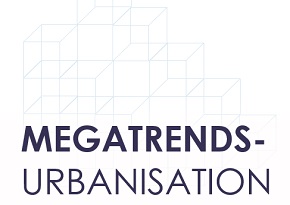Megatrends - Urbanisation report
In December 2017, BSRIA launched a report on ‘Megatrends – Urbanisation’, highlighting the major forces shaping the world in which we live and do business.
In 2015, McKinsey published 'No Ordinary Disruption', which examined 'The Four Global Forces Breaking all the Trends', identifying key trends already impacting on almost every society:
- Urbanisation.
- An ageing population.
- Globalisation.
- The revolution in technology.
The UK’s Office of National Statistics defines 'urban' as those built up areas with a population of more than 10,000. In the UK today this counts as a small town, however, in some regions of the world this would amount to a 'substantial settlement'.
Since 1950 there has been a massive global movement towards urbanisation. In 1950, fewer than 30% of the world’s population lived in urban areas. By 2010, this had reached 50% and by 2050, it is forecast to exceed two-thirds. This represents one of the biggest and fastest human movements in history. Clearly, society is changing, but what does it mean for our industry?
Henry Lawson, BSRIA’s Senior Market Research Consultant, commented:
“While there has been a lot of talk about urbanisation, in this report we are focussing especially on what it means for the building services industry.
"The world is going to carry on getting more urbanised even in countries like the UK which are already very urbanised. Socially and economically this is a very double-edged sword. In poorer countries – cities can act as engines to create wealth. Big cities can provide a concentration of people with the right skills, education and connections to drive the economy forward.
"In richer countries, however, cities often carry with them their own social problems. In countries like the UK, crime tends to be higher in urban areas.
"You might think that urbanisation inevitably leads to more cramped living conditions, but evidence from across Europe shows that some of the most densely populated countries like Belgium and the Netherlands actually have bigger homes on average than the UK, so there is a definite lesson to learn there.
"While we often think of cities as being dirty and polluting, well managed cities can actually save energy and improve the environment. People are more likely to be able to walk or cycle to work or use public transport and ‘greener’ forms of heating like district heating are more likely to be viable.
"Cities also have an important social and political impact. For example, urban populations tend to be younger. This is partly an acknowledgement of the fact that in cities it is easier to provide the education, the jobs, the entertainment and social and cultural life that younger people tend to look for. If, in contrast, rural areas tend to have an older population, then services need to be provided there to meet the needs of older people. This includes, not just health and social facilities, but also better transport for people who may have given up driving.
"There is also a political dimension. In countries like the UK and the USA the big cities often have different political priorities to the more rural areas, priorities which relate to social attitudes at least as much as income. If we are not careful, this could lead to an increasing political and social divide between town and country.
"Smart technology and the Internet of Things (IoT) is having a growing impact on cities and providing a wealth of information that can be used to run cities more safely and efficiently, notably in areas like transport and security, though of course the IoT brings with it its own security risks which need to be addressed. It also means that cities will be talking more to their component parts, such as the buildings within them.
"While parts of the world are seeing the emergence of megacities, with populations of over 20 million, overall we found that there was no one ‘optimal’ size for a city. On the contrary there are pros and cons to different sizes and it is the quality of a city’s governance and leadership and the ability of different groups to co-operate together that matters most.
"All of this is exciting, but can be confusing. We hope that this report and the ones in preparation will help BSRIA’s members, customers and partners to develop a strategy that will enable them to emerge as winners from this trend.”
The 'Megatrends – Urbanisation' report is available (as a free copy) in combination with the purchase of additional BSRIA studies.
--BSRIA
[edit] Related articles on Designing Buildings Wiki
- BSRIA articles on Designing Buildings Wiki.
- Megatrends: Smart Building Technology.
- Densification.
- How civil engineers can make cities better.
- Innovation in construction projects.
- Megacity.
- Megatrends: Globalisation.
- Shaping the Future of Construction: Inspiring innovators redefine the industry.
- The compact sustainable city.
- Urban design.
Featured articles and news
International Electrician Day, 10 June 2025
Celebrating the role of electrical engineers from André-Marie Amperè, today and for the future.
New guide for clients launched at Houses of Parliament
'There has never been a more important time for clients to step up and ...ask the right questions'
The impact of recycled slate tiles
Innovation across the decades.
EPC changes for existing buildings
Changes and their context as the new RdSAP methodology comes into use from 15 June.
Skills England publishes Sector skills needs assessments
Priority areas relating to the built environment highlighted and described in brief.
BSRIA HVAC Market Watch - May 2025 Edition
Heat Pump Market Outlook: Policy, Performance & Refrigerant Trends for 2025–2028.
Committing to EDI in construction with CIOB
Built Environment professional bodies deepen commitment to EDI with two new signatories: CIAT and CICES.
Government Grenfell progress report at a glance
Line by line recomendation overview, with links to more details.
An engaging and lively review of his professional life.
Sustainable heating for listed buildings
A problem that needs to be approached intelligently.
50th Golden anniversary ECA Edmundson apprentice award
Deadline for entries has been extended to Friday 27 June, so don't miss out!
CIAT at the London Festival of Architecture
Designing for Everyone: Breaking Barriers in Inclusive Architecture.
Mixed reactions to apprenticeship and skills reform 2025
A 'welcome shift' for some and a 'backwards step' for others.
Licensing construction in the UK
As the latest report and proposal to licence builders reaches Parliament.
Building Safety Alliance golden thread guidance
Extensive excel checklist of information with guidance document freely accessible.
Fair Payment Code and other payment initiatives
For fair and late payments, need to work together to add value.
Pre-planning delivery programmes and delay penalties
Proposed for housebuilders in government reform: Speeding Up Build Out.
High street health: converting a building for healthcare uses
The benefits of health centres acting as new anchor sites in the high street.


























